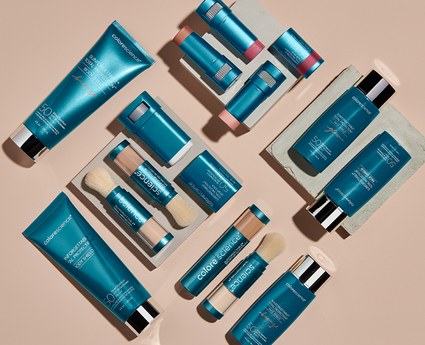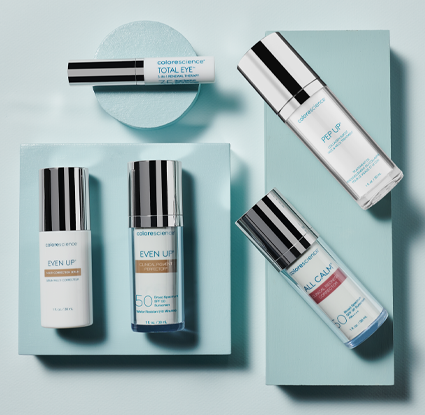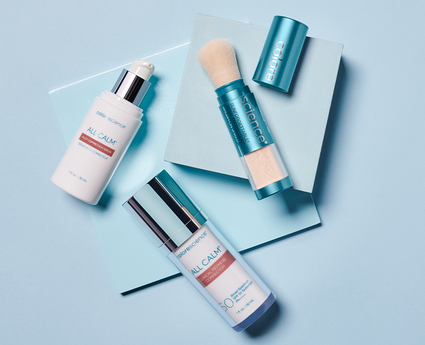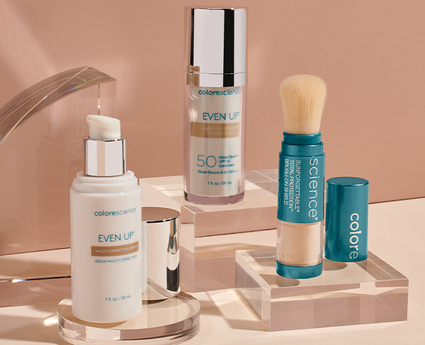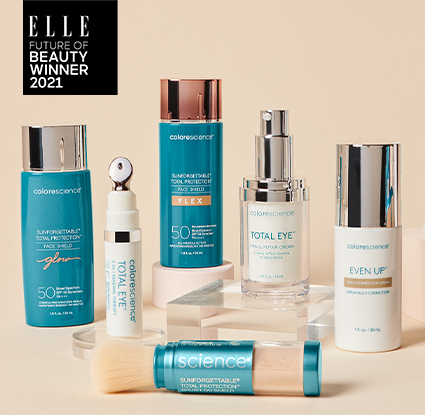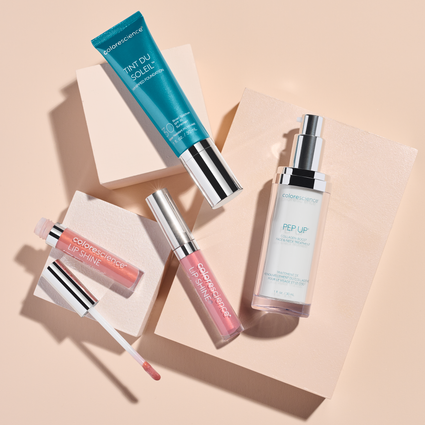Can You Use Body Sunscreen on Your Face?
We’ve all been lectured before about the importance of using sunscreen. It was ingrained in our minds as children to never leave the house without sunscreen on, and it’s a practice we continue as we get older. Not only does sunscreen protect against painful sunburns, but it also prevents early signs of aging and skin cancer.
There are many types of sunscreen out there. There’s body sunscreen, face sunscreen, and even tinted sunscreen. Different types of sunscreen work for different people, so it’s important to choose the sun protection solution that’s right for you and your skin type. Using the wrong type of sunscreen can leave you unprotected from the sun and more susceptible to skin damage.
With all that in mind, you’re probably wondering “can you use body sunscreen on your face?”. Colorescience is here to answer all your pressing sunscreen questions and help you make sure you’re as protected as possible.
Yes, you can use the same sunscreen on your face that you use on your body, but it’s generally recommended to use separate types. Face sunscreen is often formulated with different ingredients that are more gentle on the skin and thus, better for delicate areas like your under eyes and sensitive skin.
In this blog post, we’ll be discussing important questions like “can body sunscreen be used on the face?” and “what types of body sunscreen should you use?” To learn more about the differences between body sunscreen vs. face sunscreen, keep reading. You can also use the links below to go straight to the section that best answers your questions.
- Can You Use Sunscreen for Your Body on Your Face?
- Why Should You Use Separate Body & Face Sunscreen?
- What Type of Body Sunscreen Should You Use?
- How to Properly Protect Your Body Using Sunscreen
- Protect Your Body & Face with Colorescience
Can You Use Sunscreen for Your Body on Your Face?
To answer the question “can you use sunscreen for your body on your face?”, you have to consider your
individual needs. Technically, yes, you can use the same sunscreen for your body on your face, but it ultimately depends on the type of skin that you have.
For example, if you have more sensitive skin, you should probably avoid using the same sunscreen on your body and your face. Different sunscreens have their own formulas that are specifically designed to address the needs of the face and the body individually. The skin on your body can react differently to ingredients than the skin on your face. It’s the same reason why we don’t usually use body lotion on our face, or face wash on our bodies.

Using sunscreen specifically formulated for your face can also help you address common skin issues, like breakouts that may be caused by using body sunscreen. Using the right type of sunscreen also helps ensure that you’re able to apply the sunscreen properly and are effectively protecting your skin from sun damage.
So long story short—using the same sunscreen for your body on your face isn’t the end of the world and is a better option than not using any sunscreen at all. But in the long run, it’s a good idea to invest in different types of sunscreen for your face and body so that you can properly protect your skin and avoid breakouts.
Can You Use Face Sunscreen on Your Body?
Just like the answer to “can you use body sunscreen on your face?”, the answer to this question is nuanced. Yes, you can technically use face sunscreen on your body, but face sunscreen typically isn’t packaged to be used in such large quantities. Face sunscreen usually comes in a much smaller container than body sunscreen because it’s intended to cover a smaller portion of skin. So if you use face sunscreen on your body, it could cause the container to run out very quickly, and you’ll just have to keep replacing it.

Why Should You Use Separate Body & Face Sunscreen?
So now that we’ve answered the question of “can you put body sunscreen on your face?”, let’s address exactly why you should use separate body and face sunscreen.
The main reason why you should use separate sunscreens for your face and body is that the skin on your face is generally more sensitive than the rest of your body. Facial sunscreens are usually oil free, so they’re more gentle on the skin and shouldn’t break you out. Using separate sunscreens for your face and body is especially important if you have sensitive, acne-prone skin. If you have sensitive skin, you should opt for a mineral sunscreen, as opposed to a chemical sunscreen that may be harsher.
You also go through a lot more sunscreen for your body than you do for a face, since you’re protecting a much larger portion of skin. The different types of sunscreen also have different application methods.

A face sunscreen may have a specific type of applicator that’s intended to ensure the sunscreen is applied evenly. For example, some face sunscreens come with a brush applicator so that the sunscreen can be applied evenly on the face and get in all the hard to reach spaces. Alternatively, body sunscreens typically come in either a spray or squeeze bottle so you can get more product out.
Body sunscreen is also more likely to leave a white residue, which you definitely don’t want on your face. Sunscreens that are specifically formulated for the skin are typically easier to rub in and combine with other skin products.
What Type of Body Sunscreen Should You Use?
There are various qualities you should look for when deciding which type of sunscreen is best for you. Choosing the right type of sunscreen for your body ensures your skin will be properly protected and won’t cause any irritation. Here are some qualities you should look for in a body sunscreen:
- SPF 30 or higher
- Broad-spectrum
- Safe ingredients
- Water-resistance
- Hydrating formula
When choosing a sunscreen for your face and body, it’s also good to be aware of sunscreen ingredients to avoid. Some chemicals to avoid in sunscreen include oxybenzone, avobenzone, homosalate, cinoxate, and octocrylene. These ingredients can pose potential health risks, such as endocrine disruption and reproductive issues, and aren’t particularly safe to use on the skin. Instead, opt for mineral based sunscreen that’s made with safe ingredients.

What Is the Best Sunscreen for Your Body?
So now that you know the qualities you should look for in sunscreen, let’s discuss what the best sunscreen is to use for your body. If you’re looking for good sunscreen to use on your body, we can help. Colorescience carries various types of body sunscreen that are safe and effective to use on your skin. If possible, you should try to use SPF 50 sunscreen for your body to help prevent sunburn by blocking out more UV rays.
These are some of the best body sunscreens you can find from Colorescience:
- Sunforgettable® Total Protection™ Body Shield Classic SPF 50:
- Designed with EnviroScreen ® Technology to provide invisible, 100% mineral protection from UVA/UVB, pollution, blue light, and infrared radiation
- Dermatologist recommended
- Broad Spectrum SPF 50/PA++++
- Water resistant for up to 80 minutes
- Sunforgettable® Total Protection™ Body Shield Bronze SPF 50:
- Designed with EnviroScreen ® Technology to provide invisible, 100% mineral protection from UVA/UVB, pollution, blue light, and infrared radiation
- Has a natural bronze tint to it so you can achieve that summer glow without the skin damage
- SPF 50
- Water resistant for up to 80 minutes
- Cruelty free
- Reef safe
- Non-nano
How to Properly Protect Your Body Using Sunscreen
In addition to using the right type of sunscreen for your body, it’s also important to properly apply and reapply your sunscreen. If you don’t apply your sunscreen correctly, you won’t get proper protection from the sun.
Generally speaking, you should reapply sunscreen every two hours to ensure consistent protection. If you’re swimming or sweating, you should reapply every 80 minutes. Putting on sunscreen once in the morning isn’t enough—you need to reapply often. Otherwise, your skin will be bare to the elements and vulnerable to sun damage.

You should also choose a sunscreen with a strong SPF level. When in doubt, opt for a sunscreen with SPF 30 or 50. Once you go above SPF 30, there is little difference in the amount of protection it gives you, so any sunscreen with an SPF greater than 30 is a good choice.
Last but not least, ensure that you’re achieving full coverage every time you reapply. That means remembering those small and hard-to-reach spots, like behind your knees, the back of your neck, and under your arms.
Protect Your Body & Face with Colorescience
Using the right sunscreen for your face and body is imperative to keep your skin healthy and protected from the sun. Now that we’ve answered the question “can you use body sunscreen on your face?”, you can make a more informed decision about the type of sunscreen that is right for you. While you can technically use the same sunscreen on your face and body, it’s not recommended as body sunscreen is usually formulated with different ingredients that may irritate the face.
Colorescience carries various types of sunscreens that are specifically designed for the face and body, catering to their individual needs and providing you with sunscreen products that make the most sense. You can find bronzed sunscreen, brush-on sunscreen, sport stick sunscreen, tinted sunscreen, and more, so you can find the perfect sunscreen solutions that work for you and your skin.

